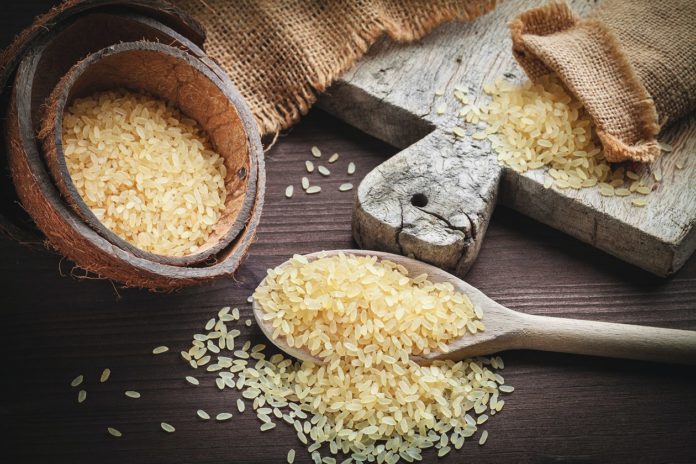Protein powder is frequently used as a supplement to help the body’s muscle recovery and repair mechanisms. Some protein powders also include stemmed amino acid residues (BCAAs) including leucine, isoleucine, and valine, which are essential for muscle growth. Lactose in whey protein makes it unsuitable for persons who are low – fat , lactose intolerant, or vegan. Fortunately, whey protein isn’t the only sort of high-quality protein powder available. Brown rice protein is among the most popular non-dairy, plant-based protein powders.
Brown rice protein is a brown rice-based protein supplement. It is processed with enzymes that separate the protein and carbs that compose up the rice, allowing it to be powdered. Protein powder is created by isolating the protein. Brown rice contains 37 percent of total protein as essential amino acids and 18 percent as BCAA, according to a 2014 article published in the peer-reviewed Foods journal titled “Amino Acid Composition of an Organic Brown Rice Protein Concentrate and Isolate Compared to Soy and Whey Concentrates and Isolates.”
Is brown rice protein a complete protein?
Though brown rice has the potential to be an excellent source of protein, it lacks lysine and must be supplemented with another lysine-containing protein, such as collagen. A complete protein is one that contains all of the body’s required amino acids in adequate amounts to sustain it. Protein is made up of amino acids, which are the foundations of the molecule. There are 20 abundant amino acids that are divided into essential and non-essential categories. Alanine, arginine, asparagine, aspartic acid, cysteine, glutamic acid, glutamine, glycine, proline, serine, and tyrosine are among the eleven non-essential amino acids that the body may synthesise.
The body cannot synthesise nine necessary amino acids, thus they must be obtained from food.
Is brown rice hypoallergenic?
Brown rice protein can be hypoallergenic on its own. It’s critical to read the labels on protein supplements to verify that the protein hasn’t been blended into a formula with other allergies.
If a supplement is relatively unlikely to produce an allergic reaction, it is considered hypoallergenic. Due to food allergies, many people are unable to consume egg, milk, or soy protein. It is a plant-based source of amino acids that is free of common allergies including soy, milk, and egg. It’s also gluten-free by nature.
Health benefits
Brown rice contains amino acids that can aid replenish blood vessels and enhance kidney and liver function. Brown rice peptide is particularly abundant in cysteine, an amino acid that helps improve lung health, athletic performance, and the body’s detoxification process. It also contains methionine, which is necessary for the creation of proteins and a variety of other biomolecules. Brown rice protein has also been demonstrated to help regulate cholesterol and blood sugar. It has been shown to be anti-diabetic, anti-cholesterol, cardio-protective, and antioxidant, according to a 2018 study in the journal Antioxidants.
Brown rice protein’s health benefits don’t stop there: It can provide similar muscle-building results to whey protein for people trying to bulk up. Researchers at the University of Tampa offered athletes rice protein after resistance exercise for an eight-week trial published in Nutrition Journal in 2013. The athletes exhibited an increase in lean body mass, a decrease in fat mass, greater skeletal muscle growth, and increased power and strength at the end of the research, all of which were comparable to the benefits of whey protein supplementation. Rice protein’s effects were found to be quite similar to those of whey protein, according to the researchers. The sportsmen were then told to employ the proteins at higher or maximum doses by the researchers.
Side effects
Brown rice protein takes longer to break down than other quickly absorbingproteins like whey because of its high fibre content. Bloating and gas can be caused by an increase in fibre and a slower digestive rate.
Brown rice is also more likely to be contaminated with the hard rock arsenic, a highly dangerous trace element that exists naturally in the atmosphere. Arsenic is divided into two types: organic and inorganic. The inorganic version, found in water and rocks, is more hazardous to human health. Because rice is grown in flooded fields, inorganic arsenic in the groundwater has the potential to enter the plant. Pollution levels are rising, and chemical fertilisers are being used more frequently. Due to the hulls of brown rice, it contains more arsenic than white rice; however, when you choose a kind of protein powder that tests for arsenic levels, you can easily prevent arsenic . High-quality protein companies want to make sure you’re not ingesting anything harmful to your health.
ALSO READ : HOW TO BOOST YOUR IMMUNITY




